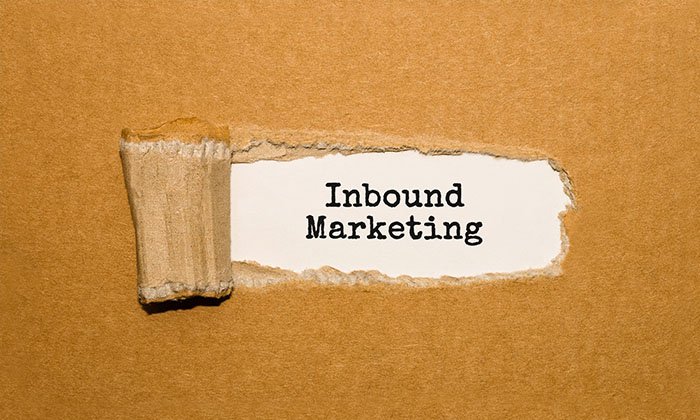
Are you ready to skyrocket your success?
If so, you need to focus your efforts on inbound marketing strategies for your startup.
Why?
It’s one of the best ways to take market share from bigger companies, and you don’t need a hefty Facebook Ads budget to compete.
Instead of broadcasting to the customer, as traditional outbound marketing does, inbound marketing focuses on creating reasons for the customer to come to you.
According to HubSpot, which coined the term “inbound marketing” back in 2006, the strategy consists of four stages.
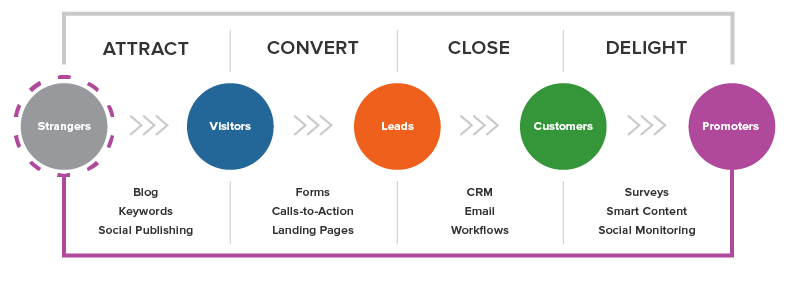
It’s a proven system that works for the best companies in the world, and it has launched dozens of startups to stellar success.
Inbound Marketing Strategies for Start-Ups
Now that you know what is inbound marketing and how it works, let’s dive into the best strategies for inbound marketing for startups.
1.Use Facebook to Create a Target Persona
The first and most critical part of creating compelling content is understanding what your target customers want to learn.
You need to have an in-depth knowledge of your market so you can react quickly.
Here’s how you learn more about who your audience is by reviewing your Facebook Page Insights.
First, go to your Facebook page. At the top, you’ll see a button labeled Insights. Click on it.
In the sidebar that opens, click on People.
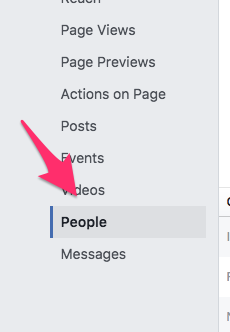
From there, you’re going to want to look at the Your Fans column. Check to see where the percentages lie to understand what demographics apply to your business.
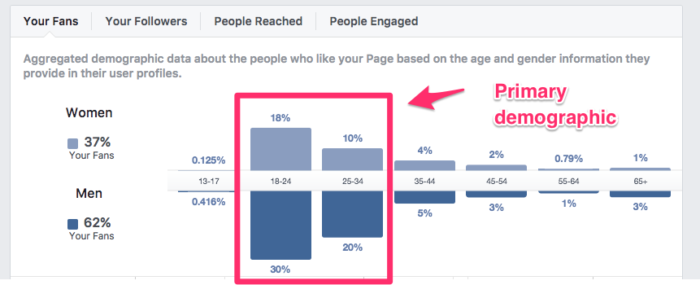
This can give you a general feel for who is interested in your startup and start forming the basis of your target persona. But that’s not all we need.
Next, we will find out what interests these people and how you can write content that appeals to what they care about.
2. Survey Your Current Customers and Leads
The easiest way to get to know your target market is through a survey.
This doesn’t have to be complicated. If you already have an email list, you can send them a simple form through SurveyMonkey.
To make this work, you only need to ask one question: “What is your biggest struggle?”
Your goal is to understand the problems they’re facing so you can create compelling content that targets their deepest interests.
3. Conduct In-Depth Interviews to Inform Your Inbound Marketing Efforts
Once you have the general feelings of your target market, it’s a good idea to start seeking out individuals you can contact for more in-depth information.
I recommend looking for a few clients or customers you’ve already acquired.
Ask them if they’d be OK with a 10-minute phone call or a video chat about their current struggles. Mention you’ll offer them advice if you can.
(Usually, customers are excited about this. It’s like a free consultation for them.)
Once you’re on the call, try to find out exactly what their biggest struggles are. Ask them to describe those struggles in the clearest language possible.
Get to exactly what frustrates them and what solutions they tried before but didn’t work.
You’ll use this data to create content.
4. Create and Share Compelling Content
The quality of the content you create is the most important feature of your inbound marketing strategy.
If you create generic, self-serving articles and videos, you’ll never see success.
No matter how hard you promote this content or how you designed it to rank well in search engines, you’re going to struggle to find new clients and customers.
The best-in-class content marketers work tirelessly to adapt their content to the target audiences they want to attract — and where they are in the customer journey.
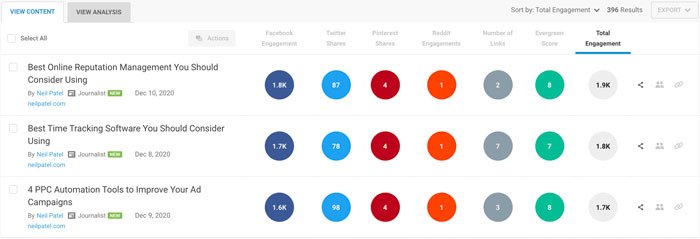
5. Writing Enticing Headline
Understanding the customer journey and their needs is critical to making great content, but it’s not the only strategy you’ll need to draw in new customers and leads.
The most important piece of the work you create is the headline. This is what will drive the most clicks and draw in new traffic.
You should spend lots of time crafting a headline that appeals to your most targeted customers.
One of the best ways to do this is to include a bit of negativity, according to data by WordStream.

Of course, you shouldn’t always have negative headlines.
But if you have a list of mistakes or talk about the worst strategies that could hurt your customer, this can be an effective way to drive traffic.
According to Demand Metric, companies with blogs generate 67 percent more leads per month than those who don’t.
If you’re going to produce this content, you need to make sure it works to its best ability.
7. Make Your Content More Visual
Humans love visual content. For your content to appeal to your ideal readers, make sure there’s more to it than just large blocks of text.
Including lots of images, charts, and graphs is a technique I use to make my content more appealing, and I’m not alone.
90 percent of bloggers include images in their posts, and those who add multiple images report stronger results.
The more visual your content, the more likely it’s likely to improve your inbound marketing efforts.
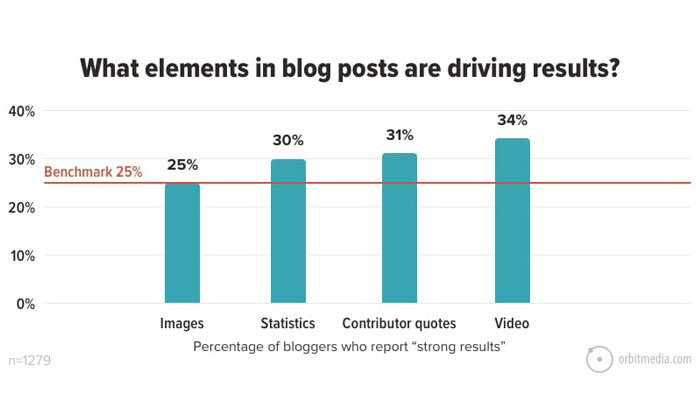
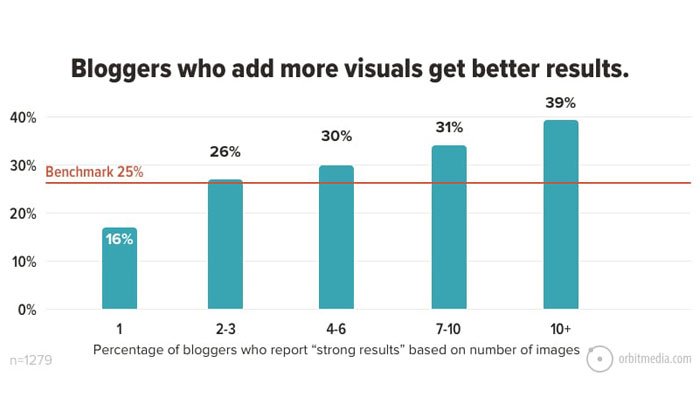
6. Write In-Depth Data-Driven Articles
Instead of writing short posts, you should be doing extensive research and producing in-depth content.
According to research by Curata, long-form content generates eight times more page views, nine times more leads, and three times more social media shares than short-form content.
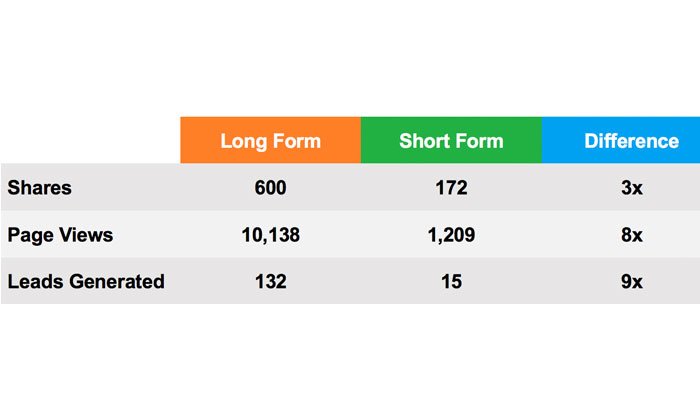
You should be writing articles that are a few thousand words long and supported by lots of data and analysis.
This is not only better for your SEO rankings, but it’s also more helpful for your customers.
The better your content, the more likely your readers are to share it with friends, recommend your site to others, and implement what you say.
8. Use Storytelling in Your Content
Just because you base your content around data and analysis doesn’t mean it needs to be dry and academic.
You should work to produce the opposite type of content. You want to create articles that tell a story.
Why?
Using storytelling in your content (from sales pages to social media posts) is a way to create an emotional connection with your audience.
Storytelling has another powerful function. It creates brand recall. Research by Stanford University shows people are 63 percent more likely to remember a story than a statistic.
Not convinced?
Chris Haddad (a relationship coach) went from a 2 percent conversion rate to 8 percent by changing his sales page to include a relatable personal story.
How can you use this tactic in your startup? Look for opportunities to weave in stories when talking about your product or business.
Sure, your benefits and features are great, but the emotional connection you create with storytelling will close the sale and help grow your startup through inbound marketing.
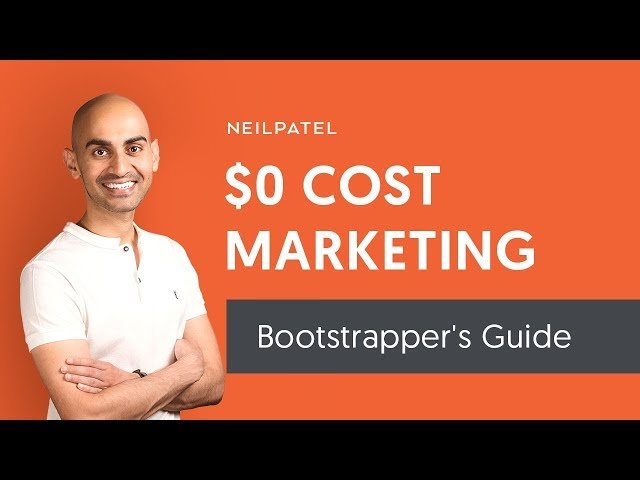
9. Make a Habit Out of Guest Posting Consistently
When you look at the data, you’ll find that guest blogging is the best inbound marketing strategy.
This is because it provides you with backlinks, authority in the space, and relationships with key influencers.
But most people go about it the wrong way. If you aren’t using smart strategies to spread your startup’s message through guest posting, you might as well not do it.
If you want to reap the benefits of guest posting, you need to write consistently.
This is how the most successful startup owners have made guest blogging work well for them. Instead of a few posts, they wrote prolifically and gained ground quickly.
If you do a Google search for guest posts by Danny Iny, you’ll find dozens of pieces of content across the web.
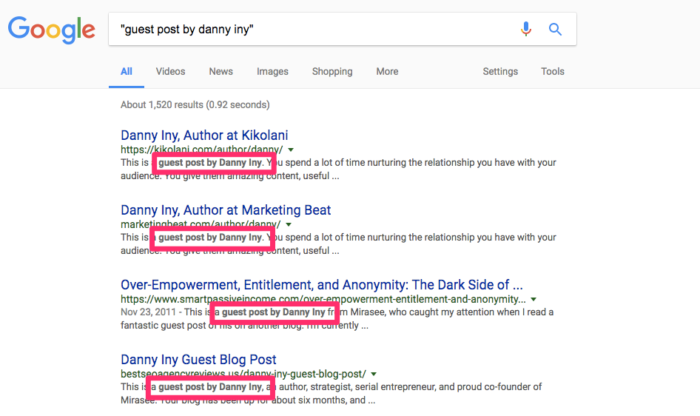
This massive, consistent guest-posting strategy allowed him to grow his business Mirasee into the powerhouse it is today.
On his homepage, he displays an in-depth list of all the sites where he has been featured.
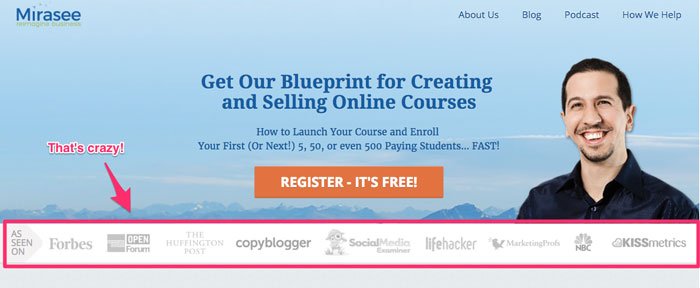
Dedicate some of your time to creating compelling content for other blogs to reach as many customers as possible.
10. Pitch to Blogs with Engaged Readers
Another problem I see with entrepreneurs who want to use guest posting as an inbound marketing strategy is that they don’t look for sites that will give them much ROI.
The truth is that every guest post requires work, and that’s work that needs to give you a distinct benefit in visitors or leads.
If you post on a blog that has a dead audience, you won’t get any benefit, and you’ll have wasted your time.
I like to look at the comments on different sites. For example, if I wanted to write a guest blog for WordStream, I can see their posts get lots of relevant comments.
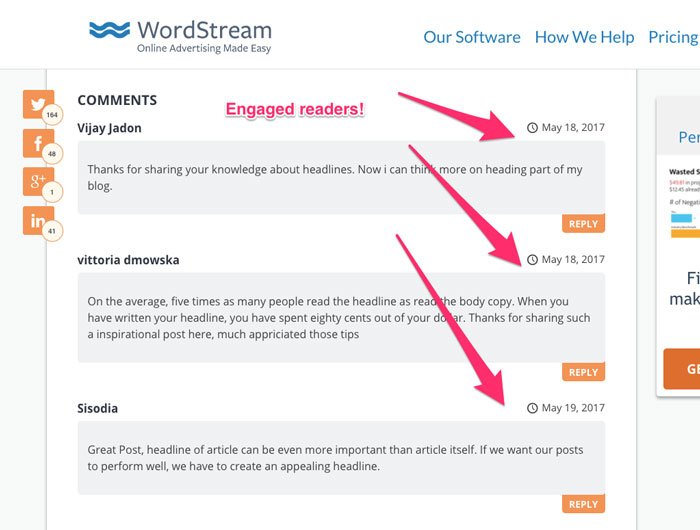
This tells me the readers are engaged, and a blog post here might result in readers clicking through to my startup’s website and purchasing from me.
11. Maximize Your Results from SEO with Keyword Optimization
You need to understand SEO to achieve any success with your startup in today’s search-driven marketplace.
The most important things to focus on are basic on-page SEO and backlinks for your site and your content.
How do you do that? Keyword optimization.
You want to find specific long-tail keywords which you’d like to use for targeting your content.
Why?
Long-tail keywords have a three to five percent higher click-through rate than generic searches.
The more specific someone is in their search, the more likely they know what they want and are close to converting into a customer.
12. Promote Your Content to Build Backlinks
Backlinks are perhaps the most important factor in your search engine results.
At the simplest level, backlinks are other sites that link to your site. There are lots of ways to increase the number of backlinks you get to your content.
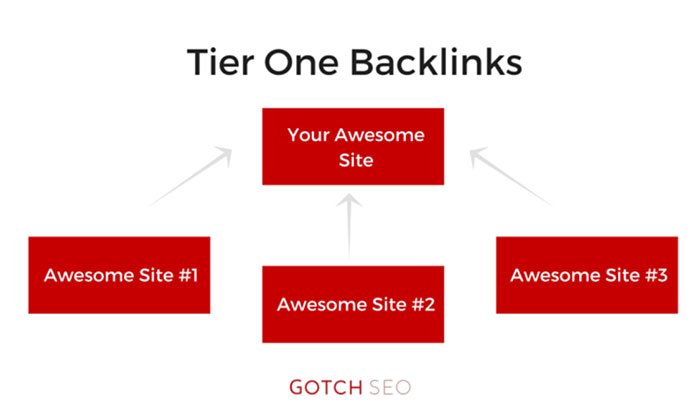
By promoting your content to other relevant influencers, you can increase the number of people that link back to you.
The exact number of backlinks you need to be successful on the search engines varies depending on the keyword, topic, and the competing sites that are ranking well now.
With careful prompting, though, you can easily outrank pages on massive sites with more authority.
Not sure where to start with backlinks? I’ve created a free backlink checker tool you can use to find out who is linking to your startup’s competition.
13. Acquire Inbound Marketing Leads with Free Content
When it’s time to convert your visitors into leads, you need bulletproof strategies to get people to give you their email addresses.
The best method I’ve seen is to offer free content in exchange for this contact information.
If your startup is in the B2B sector, or if you appeal to customers who want or need in-depth analysis before purchasing, you can make an effective lead magnet from a report.
This is a great way to get leads because the comprehensiveness of your work seems like a great deal for an email address.
HubSpot’s list of marketing statistics includes a pitch for their “State of Inbound Marketing” report. This is a detailed guide with massive amounts of high-quality data.
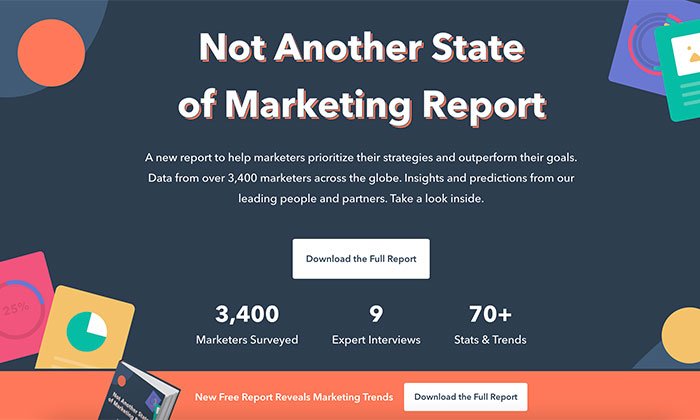
But they aren’t giving this away for free. To receive the report, you need to provide a detailed amount of information that HubSpot will use to follow up with you on their products.
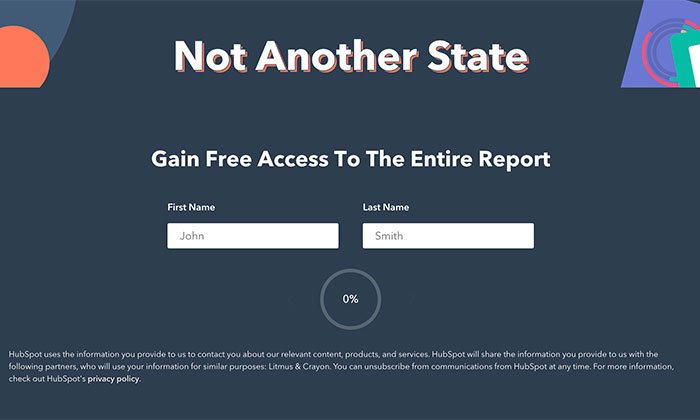
This is an effective way to drive your visitors into your sales funnel and reach them even more effectively.
14. Host a Free Webinar
One of my favorite inbound marketing techniques for startups is free webinars that encourage customers to learn in real-time.
This is great because it lets them see your face and understand your personality. Besides, lots of people will download a guide and never read it.
But if someone signs up for a webinar, you can see if they watch the whole thing.
I have used this kind of training on my homepage in the past. I didn’t call it a webinar, though. I just used the term “training.”
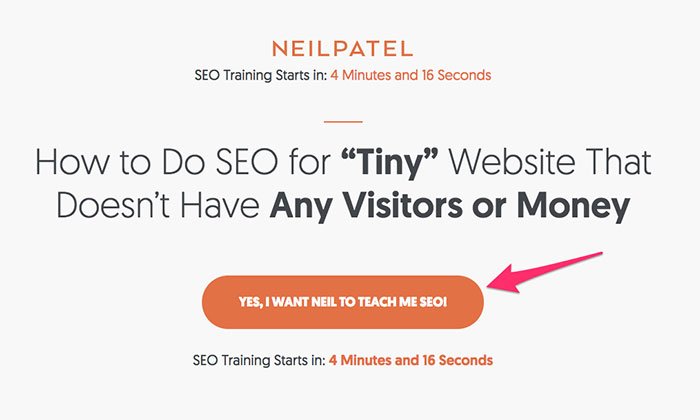
This is a great way to increase your leads as visitors must enter their first name and email address to access the training.
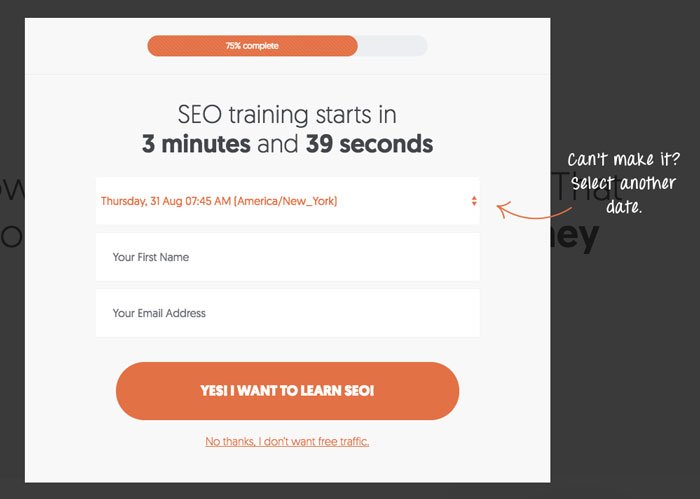
Since this is such a valuable teaching piece, people who come to my website are happy to provide their email address to learn SEO better.
15. Launch an Email Course
There’s another form of content you can create that will drive new customers.
Even better, it won’t require the extensive research that a report demands or the complicated backend software necessary for a webinar.
That strategy is to create an email course. This is a simple way to provide extra value without spending tons of time creating something with design elements or video.
A great example is a free masterclass Mariah Coz offers. Because it’s a course, it makes the content feel more valuable.
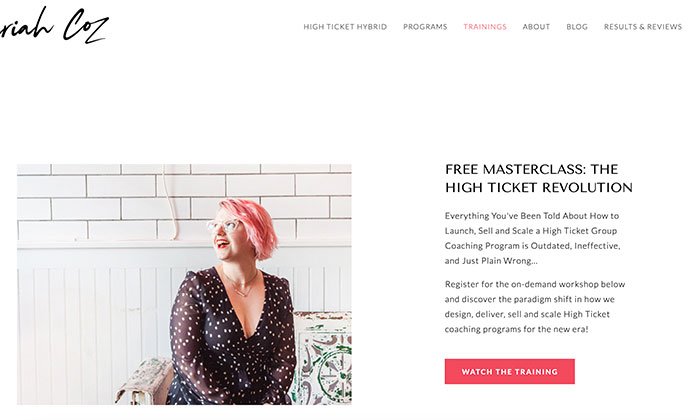
If you’re currently giving away an e-book for your startup and you’ve found that it isn’t converting well, consider breaking down the content into sections.
Then use each section as a separate email. You may find that an email course or a masterclass converts even better than an ebook.
16. Start an Influencer Marketing Campaign
According to a survey by Influencer Marketing Hub, 75 percent of brands have a dedicated budget for influencer marketing, and 90 percent of respondents believe it’s an effective form of advertising.
If you do this the right way, it can be a free or paid method to get people excited about your brand.
If you’re going to launch an influencer marketing campaign, you need to understand what will make it work best.
First and most importantly, you need to make sure you’re appealing to the right influencers.
This is easy to get wrong, as the people you think you’re appealing to may not be persuasive to your target audience.
The earlier research you did on your audience should be a great starting place to understand who they pay attention to, but you might need to do even more work than that.
How do you find the right influencers for your startup? You can:
- Google phrases like “top [niche] influencers.
- Browse hashtags on Instagram related to your niche.
- Use Influencer platforms to connect with creators.
- Search key phrases on Ubersuggest to find blogs that appeal to your target audience.
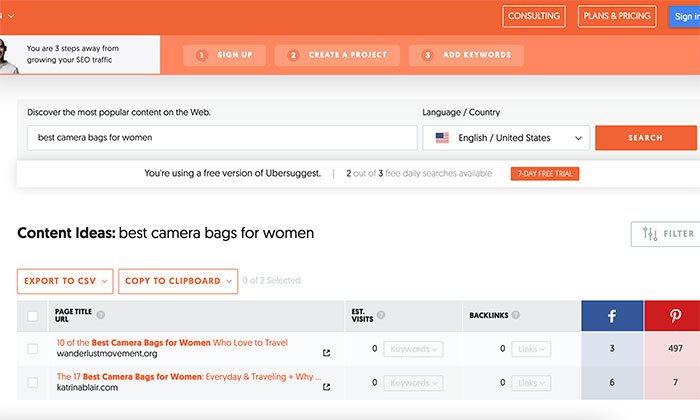
17. Build Relationships with Influencers
Once you know which influencers are best for your brand, you need to start targeting them specifically.
While you can just run into promotion and start spamming them with requests to share the content you created, this won’t be very effective.
You’ll irritate them and ruin the relationship.
Instead, you need to start slow and gradually build a relationship with the influencers you’d like to promote your content.
One of the best ways to reach influencers is through targeted communication on social media. You can let them know when they inspired you to write.
You should also do everything you can to help those influencers by providing communication that’s always focused on their needs.
While it may seem frustrating to always focus on them, you’ll eventually start to build a relationship that allows you to make a small request.
If you’ve built great relationships from the start, they’ll be happy to oblige.
18. Build Effective Email Campaigns
You already know that email marketing is critical to a successful inbound marketing campaign for your startup.
But are you using it effectively?
Email marketing has a massive ROI.
According to Litmus, the average ROI was $42 for every $1 spent on emails.
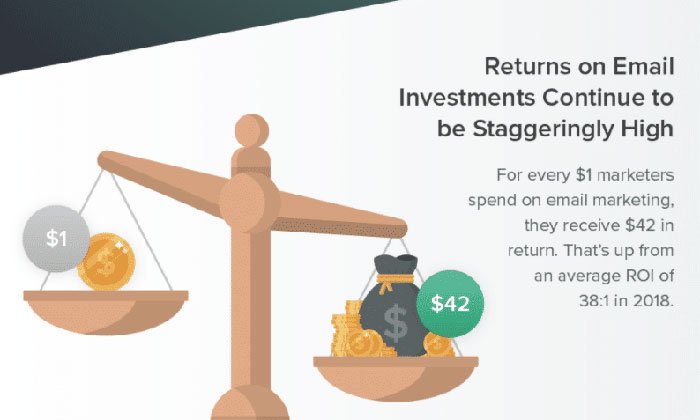
But to make it work, you need to be strategic with how you promote your brand through email.
19. Send Helpful Content to Subscribers
First and foremost, you need to be useful to your subscribers. When someone signs up, you need to provide them with a reason to stay on your email list.
If you’re constantly spamming them or sending worthless content, they’ll unsubscribe and probably never return.
Instead, send emails with valuable information they can’t get anywhere else.
Buzzsumo does a great job with this in their articles and emails. Their weekly update includes a report on engagement on Facebook, based on 880-million posts.
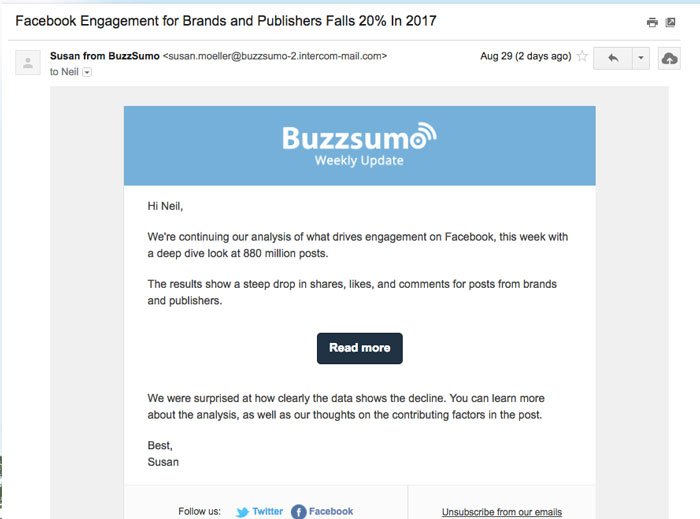
That’s a hugely valuable piece of content I want to read.
More importantly, I want to stay subscribed to the newsletter, and I’ll keep looking forward to their emails.
This is the kind of reaction you need to build with your subscribers. If they’re looking forward to your marketing, you’re doing it correctly.
20. Stick with Email Marketing for The Long Term
You need to be in the email game for the long term.
If you’re not consistently providing great content with your inbound marketing, you’re going to be frustrated.
Instead of pitching your product immediately after someone signs up on your email list, send them a welcome sequence that gradually introduces them to what you have to offer.
According to Invesp, the average cost of a lead drops 80 percent after five months of consistent inbound marketing.
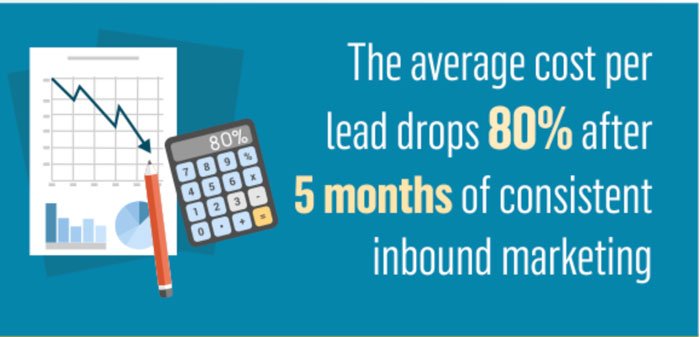
If you want to save massive dollars on your marketing strategies, you need to get ready to work for a while on each prospect.
Be patient, and you’ll be thankful for the results.
21. Make Your Website Convert Like Crazy by Making it Mobile Friendly
Ultimately, the goal of much of your inbound marketing strategy is to drive people to your startup’s website.
If you’re not converting people once they arrive, however, what’s the point?
Conversion is the key to successful inbound marketing since it’s the transition from visitor to prospect.
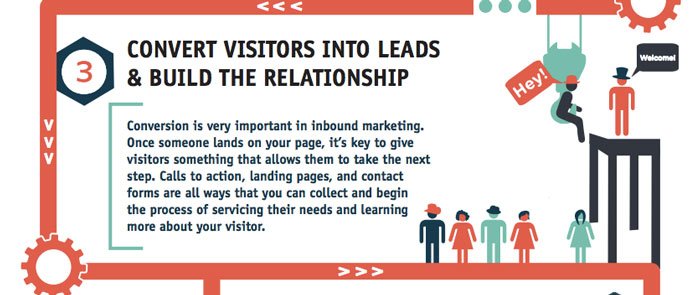
You need to make sure your website is ready to convert your traffic into leads and customers.
It’s the only way to make your startup grow with the traffic you’ve worked so hard to acquire.
The first and most important way to ensure you’re getting the conversions you deserve is by making your website mobile accessible.
If your startup’s site isn’t responsive, you’re going to struggle to convert the traffic you’ve worked so hard to drive there.
According to WVO, out of 100 leading websites, only 11 were responsive. Perhaps even more telling, only seven of 148 companies felt the need for mobile optimization.
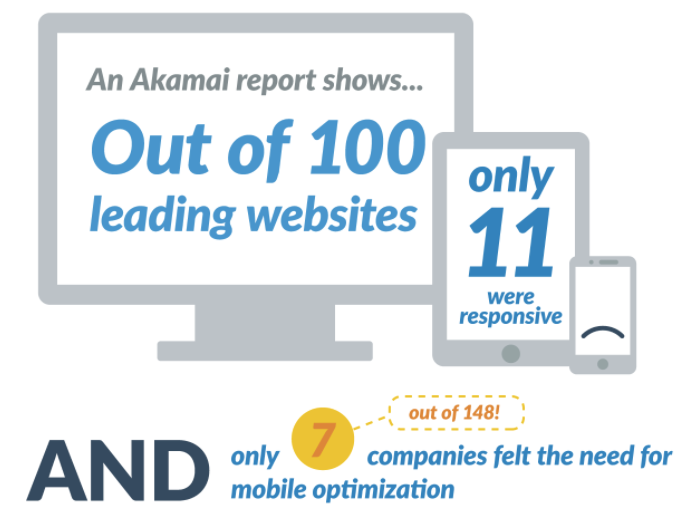
In short, the vast majority of websites aren’t appealing to mobile users, and they aren’t putting in the work they need to make these changes.
Instead of actually converting their mobile customers, they’re losing out on valuable traffic.
Don’t let that happen to you. Make sure your site is responsive and that it works well on mobile.
22. Install Hello Bar
If you want to get more conversions from the traffic you’re sending to your site, you should consider installing Hello Bar.
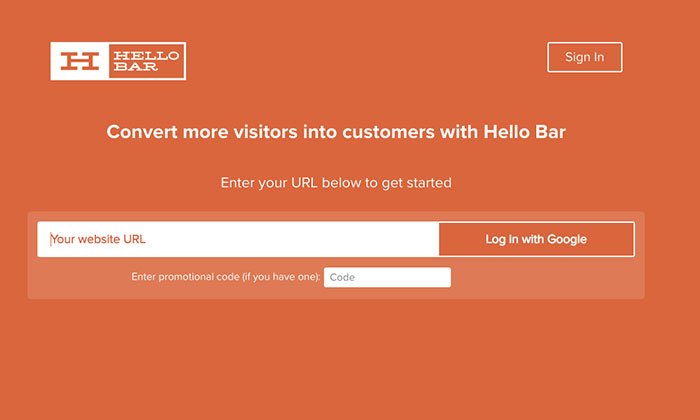
This is a simple tool that allows you to add a signup form at the top of your website. Since it’s unobtrusive, it won’t distract from the user experience.
But since it’s always at the top of your pages, it will drive massive conversions.
It’s a great way to get a few new leads each day.
23. Drive Conversions with Content Upgrades
If you want to skyrocket the conversions you’re getting from the content you publish on your website, look no further than a content upgrade.
Unlike a traditional lead magnet, a content upgrade will optimize your highest-converting pieces of content.
A great example is the “700+ Power Word Cheat Sheet” used in the article on the topic over at OptinMonster.
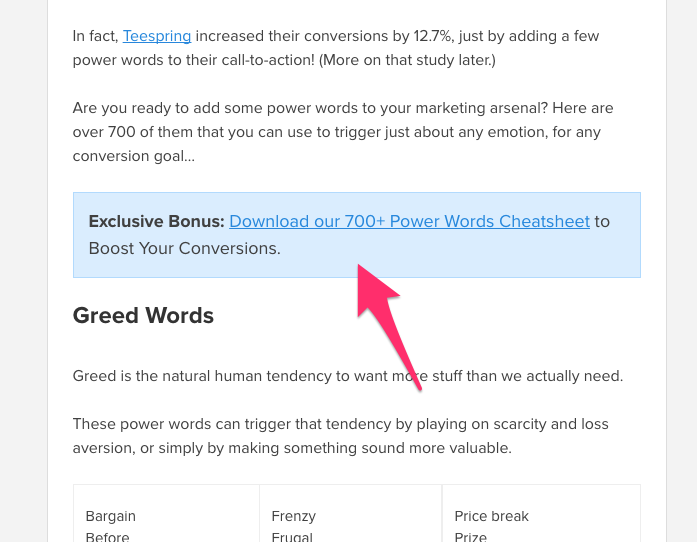
Because the people reading this article are interested in finding out more about the words that can make their writing more effective, this is a great way to encourage them to sign up.
You can do the same thing. To make this work, find a popular article and create a custom bonus that adds to the piece of content you’ve already written.
Link this in the article, and watch the new leads for your startup skyrocket.
24. Test and Refine Your Inbound Marketing Strategies
It’s no secret that I think testing is the only way to improve all kinds of marketing.
This applies to the inbound marketing strategies you’re using for your startup as well.
You need to monitor your results and make gradual improvements to different components of your campaign.
If they don’t work as expected, you should refine those strategies and try something new. But even if they do work for you, I recommend going back and making improvements.
Keeping an A/B split-test running at all times is a great way to make small but consistent changes to your marketing strategy and to make sure everything is working at its best.
Inbound Marketing Strategy FAQs
An inbound marketing strategy attracts prospects to your brand by creating valuable content that is relevant and helpful.
The five principles of inbound marketing are standardize, contextualize, optimize, personalize, and empathize.
Videos, blogs, pillar pages, eBooks, social media, press releases, infographics, newsletters, research papers, podcasts, webinars, and expert interviews.
You need to know the purpose of your content, your target audience, and how your content fits in with the buyer’s journey.
Inbound Marketing Strategies Summary
If you’re launching a startup, you want to make sure you’re implementing the best practices for extremely fast growth.
By now, you know that inbound marketing is the most effective way to increase your visitors, leads, and buyers.
You’ll need to attract customers by understanding their deepest needs, aspirations, and struggles. Using that data, create epic content that draws them in like a magnet.
Extend your reach to other sites, present your content around the web, acquire new customers, and build your influence and authority.
You’ll need to include SEO best practices so that customers can find you through search engines as well.
Once you have the traffic, convert those visitors with free content and influencer marketing that drives leads.
With a compelling email campaign and a high-converting website, you can grow your business like never before.
Which inbound marketing strategies will you use to grow your startup?





Recent Comments